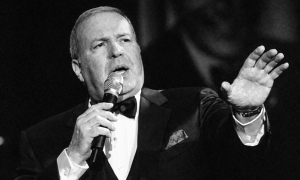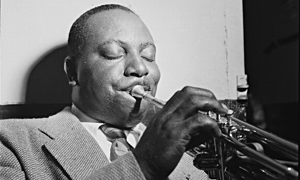Home » Jazz Articles » Book Review » More Than A Jazz Legend: Dexter Gordon and His Search Fo...
More Than A Jazz Legend: Dexter Gordon and His Search For Personal Integrity
 Sophisticated Giant: The Life and Legacy of Dexter Gordon
Sophisticated Giant: The Life and Legacy of Dexter Gordon Maxine Gordon
261 Pages
ISBN: #9780520280649
University of California Press
2018
Dexter Gordon became a jazz legend in his own time. He played a key role in the bebop and hard bop movements, created an instantly recognizable style that came from Louis Armstrong and Lester Young but moved quickly into the modern jazz era, and established a new standard for tenor saxophone playing. His music and rich recorded legacy has sustained its appeal to several generations of jazz fans. His playing was controlled, knowledgeable, and electrifying. Gordon also had a big, warm personality that lit up a room. "Long Tall Dexter" was six foot five in height, and his words introducing the tunes by quoting from the lyrics, delivered in a deep, melodious voice, charmed his audiences. At the end of a song, he tilted and held up his saxophone in the way that Lester Young did. Decades later, many who saw him in person still fondly remember these hallmark gestures.
There were many aspects of Dexter Gordon's life that made him an even larger figure, the "sophisticated giant" that the title of Maxine Gordon's new book implies. (The title, by the way, is taken from one of his recordings.) His widow Maxine, who for many years also served as his road manager and business partner, knew him inside out through close proximity, business ventures, and long conversations in which they shared every aspect of their lives. In addition, she retained his autobiographical notes, and being a trained researcher into African American history, she made extended forays into the neighborhoods and archives to fill in details, ask and answer questions, and get a historian's perspective about the world in which he lived and made music. As a result of the author's combined interests and her intimate relationship with Dexter, the humanness of this man of multiple gifts is transmitted to us in a way that is palpably felt.
What emerges is a sense of an African American man who survived the indignities of segregation and drug addiction with grace, hope, resourcefulness, and integrity. The overriding impression of Dexter Gordon the human being is of someone who falls but always gets up, who has flaws but transcends them, who sustains his dignity in the most challenging circumstances, who is reflective about life's difficulties but always hopeful and ready to take on the next task. In this respect, he differs from some of his most noteworthy peers like Charlie Parker, Chet Baker, and Gordon's beloved friend and tenor saxophone cohort Wardell Gray, all of whom, like many others, went into the darkness and never came out. His paternal grandfather, Captain Edward L. Baker, Jr., was a member of the Buffalo Soldiers of the Tenth Cavalry Regiment after the Civil War. His paternal grandfather, Frank Gordon, a barber, was a man of character and a valued citizen of Fargo, North Dakota. And his father, Dr. Frank Gordon Jr, was a prominent physician and music lover in Los Angeles, whose patients included noted jazz musicians like Duke Ellington and Lionel Hampton. Dexter was thus given a legacy that fostered independence, ambition, resilience, knowledge of the world and of literature, and compassion for the common man.
Throughout the book, Maxine provides rich descriptions of people, places, and events, often quoting from Dexter. Through her meticulous research, new information about him emerges. In particular, she documents the manipulation of royalties and creative property rights in the music industry in ways that not-so-subtly suggest its relationship to racism. While meticulous about details, the author is also a good storyteller, so, aside from its scholarly discipline, the book is intriguing and leads the reader forward like an absorbing detective novel.
The book takes us through Dexter Gordon's high school years when he took up saxophone and performed with his peers, to his induction into Lionel Hampton's band, and soon after that, Billy Eckstine's forward-looking crew which included Charlie Parker, Dizzy Gillespie, Gene Ammons, and Art Blakey in a list that reads like a Who's Who of modern jazz. Landing in New York, he was thrilled to hear the great bands at the Apollo Theater and Minton's Playhouse in Harlem. When he sat in with, among others Lester Young and Ben Webster, he was immediately recognized as a comer, and soon thereafter he appeared on recordings, notably on the Blue Note label, which established him as a top jazz artist.
Like so many other jazz musicians of the time, his life then became a roller coaster ride of performances, exhausting road trips, and periods of addiction which led to down time and incarceration. As if to start a new life but ultimately rejecting the politicized label of expatriate, he moved to Copenhagen. In a fresh European context, where blacks were treated as equals and jazz musicians as respected artists, he matured both as a musician and a person, although his addiction, marital problems, and botched love affairs sometimes got in the way. In Copenhagen, Paris, and elsewhere, he worked with the best musicians of the time, including Ben Webster, Bud Powell, pianist Kenny Drew, the Danish bassist Niels-Henning Orsted Pedersen, and others, many of whom would work with him at Gordon's favorite club, Montmartre in Copenhagen.
During that time in Europe he met Maxine, who was assigned to be his road manager and eventually helped him to return to the U.S. She arranged for him to perform at the Village Vanguard with his friend and Maxine's then life partner, trumpeter Woody Shaw. The excitement generated by that and other performances led to a prestigious recording contract for Columbia Records initiated by its prescient executive Bruce Lundvall. These events are well known, but Maxine fills in many details and portrays Dexter's human side. Particularly moving during the Europe stay are the stories of Gordon's warm but sometimes competitive interactions with Ben Webster, and the compassionate response of Danish law enforcement to his drug use, in stark contrast to what was happening stateside at the time.
Finally and permanently established in New York (and their second home in Cuernavaca, Mexico), the Gordons experienced a period of contentment, financial success, and Dexter's musical prominence. Dexter became a devoted stepfather to Maxine's and the Shaw's son, Woody Louis Armstrong Shaw III. Then, in 1985-6, their lives changed completely when, out of the blue, Dexter, who had worked for a short time as an actor in Los Angeles, was given the lead role in Bernard Tavernier's iconic film, Round Midnight about the life of a jazz musician in Paris (based on the lives of Lester Young and Bud Powell). Familiar with many aspects of the story from his own experience, Gordon advised Tavernier in setting up many of the scenes. His acting was so stunning and natural that it earned him an Oscar nomination for Best Actor. He treasured rare praise from no less than Marlon Brando. Gordon also won a Grammy for his playing in the film's soundtrack (although Herbie Hancock, who appears in the film, wrote the score).
For the brief remainder of his life, until he died in 1990 of kidney failure and other conditions, the Gordons grew still closer and spent much of their time in Cuernavaca enjoying the company of friends and reflecting on their lives. Maxine promised Dexter she would get a college degree and write his biography, for which he had made copious notes. He performed occasionally, including a session in Canada which has been released as his last recording. Maxine does not use the word love and does not present their relationship as romantic, but she describes their interactions and conversations in a way that is touching and bespeaks mutual care, respect, and affection that would serve any relationship well. In an entertainment business where marriages are often troubled and end precipitously, it moves the heart to see the depth of their friendship, which after all, is what makes a relationship last and have enduring value. It also makes this book a memoir as well as a biography. And present always as both author and part of the action is Maxine, a woman who, as her friends know, has given of herself in so many ways to befriending and advancing the careers of jazz musicians.
This book, as Nat Hentoff wrote about jazz itself, "tells a story." It is an important story because it is about a musician who, in the midst of the hipster and rather crude period of materialism and existential defeat and despair that characterized the jazz culture of the time, stood apart from the crowd and maintained a sense of personal commitment and dignity. It is also the heartening story of a couple, Dexter and Maxine, who found themselves through each other and the music they loved. And ultimately, it is the story of how any of us, through our creativity, persistence, and authentic relationships with others, can weather and transcend the crush of the Sartrean "gaze" of racism, materialism, and conformism to become fully human and achieve our most cherished goals.
Tags
Book Reviews
Victor L. Schermer
University of California Press
Louis Armstrong
Lester Young
Charlie Parker
Chet Baker
Wardell Gray
duke ellington
Lionel Hampton
Billy Eckstine
Dizzy Gillespie
Gene Ammons
Art Blakey
ben webster
Bud Powell
Kenny Drew
Niels-Henning Ørsted Pedersen
Woody Shaw
Bruce Lundvall
PREVIOUS / NEXT
Support All About Jazz
 All About Jazz has been a pillar of jazz since 1995, championing it as an art form and, more importantly, supporting the musicians who make it. Our enduring commitment has made "AAJ" one of the most culturally important websites of its kind, read by hundreds of thousands of fans, musicians and industry figures every month.
All About Jazz has been a pillar of jazz since 1995, championing it as an art form and, more importantly, supporting the musicians who make it. Our enduring commitment has made "AAJ" one of the most culturally important websites of its kind, read by hundreds of thousands of fans, musicians and industry figures every month.



























